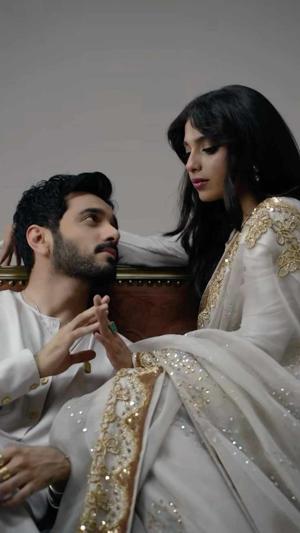Time lost all meaning in the ICU waiting room. It became a flat, grey expanse measured only by the hushed voices of doctors, the soft squeak of nurses' shoes, and the intermittent, gut-wrenching sobs of Mrs. Raichand.
I couldn’t leave. Even though every logical part of my brain screamed at me to go, to retreat, to protect myself, my feet were rooted to the spot. I had collapsed into a hard plastic chair in the corner, as far from the family as I could get while still being present. I was a ghost at the feast of their grief, a silent, guilty witness.
No one asked me to leave. In their all-consuming terror for Vivaan, my presence was a bizarre anomaly they didn't have the energy to question. I was just… there. Ananya Ma’am, the concerned teacher.
Rohan was the only one who seemed to remember I existed. Every time he came out from his brief, allotted minute in the ICU, his eyes would find me. The looks were no longer just suspicious; they were searching, probing, connecting dots with a terrifying speed. He saw the way I jumped every time a monitor alarm sounded from behind the doors. He saw the tears I couldn’t stop, tears that went far beyond professional concern. He saw me clutching my arms so tightly my nails left half-moon indentations on my skin.
After what felt like an eternity, he walked over to me. He didn’t sit. He just stood there, looming over me, his posture rigid.
“You should go home, Ananya,” he said, his voice low and strained. It wasn’t a suggestion. It was a command. “There’s nothing you can do here. My parents… they’re distracted now, but they’ll start to wonder.”
I looked up at him, my vision blurred by tears. “I can’t,” I whispered, my voice raw. “I need to know if he’s…” I couldn’t finish the sentence.
The word okay was too insignificant. He would never just be “okay” again. The doctor’s words echoed in the silence between us: significant head trauma.
Rohan’s jaw tightened. He crouched down so his face was level with mine, his voice a harsh whisper meant only for my ears. “Why, Ananya? Why do you need to know? What is my brother to you?”
The question hung in the antiseptic air, direct and dangerous. This was it. The precipice. I could lie again, cling to the pathetic story about the college secretary. Or I could tell the truth and watch our carefully constructed world explode.
I opened my mouth, but no sound came out. A fresh wave of tears was my only answer.
The pain in Rohan’s eyes solidified into something harder. Something like betrayal. He had his answer, even without words.
He stood up abruptly, turning his back on me. “Just go,” he said, his voice flat and final. “Before you make this worse.”
Worse. How could it possibly be worse? Vivaan was lying in a coma, his life hanging by a thread, and it was my fault. I had rejected him. I had pushed him away. I had filled him with a despair so profound that he had gotten on his bike and driven like a maniac. This was the consequence of my cowardice. This was the price of our secret.
I didn’t go. I couldn’t. I sat in that chair for hours, through the long, terrible night. I watched the Raichands’ hope wax and wane with every doctor’s update. I watched Rohan’s posture become more and more rigid, his distance from me growing into a chasm.
At some point, exhaustion must have claimed me. I fell into a fitful, nightmare-ridden doze, my head leaning against the cold wall.
I was jolted awake by a change in the atmosphere. The sky outside the window was lightening to a pale grey. A new doctor was talking to the Raichands, her tone cautiously optimistic.
“…vitals are stabilizing. The induced coma is doing its job, giving his brain time to heal. He’s a fighter.”
Mrs. Raichand wept with relief, clinging to her husband. Rohan let out a long, shaky breath, some of the tension leaving his shoulders.
He was stable. He was alive.
The massive, suffocating weight of immediate dread lifted just enough for me to breathe. But it was replaced by a new, more insidious fear: the fear of what came next.
As the family huddled together, sharing a moment of fragile hope, Rohan turned. He looked across the room at me, sitting alone in my corner. The suspicion and anger were still there, but now they were tempered by a cold, grim resolve.
He walked over to me, each step measured and deliberate. He didn’t crouch this time. He just looked down at me, his expression unreadable.
“He’s going to live,” he stated, his voice devoid of emotion.
I nodded, fresh tears of relief spilling over. “Thank god.”
Rohan’s eyes were like flint. “When he wakes up,” he said, his voice dropping to a deadly calm whisper, “you will stay away from him, Ananya. Do you understand me? You will not visit. You will not call. You will have no contact with him whatsoever.”
I stared at him, stunned by the cold finality in his tone.
“This… this fascination he has with you, this… whatever it is,” he continued, his words precise and cutting, “it ends now. It almost got him killed. I won’t let it finish the job. You will marry me. You will be my wife. And you will be a sister to him. Nothing more. Is that clear?”
It was an ultimatum. A life sentence. He was carving out our future with a scalpel, removing the cancerous part—my feelings for his brother, Vivaan’s feelings for me—and stitching the rest back together, no matter how scarred and mangled it would be.
He wasn’t asking for my confession. He didn’t want to know the truth. He wanted it buried. He wanted the perfect picture restored, even if the frame was cracked and the image inside was forever stained.
He was choosing ignorance to save his family. And he was demanding I do the same.
I looked at him—this good, kind, stable man I was supposed to marry—and I saw a stranger. I saw the ruthless pragmatism that lay beneath the polished surface. He would lock this secret away in a vault to protect the Raichand name, to protect his brother from himself, and to keep his perfect fiancée.
And I, trapped by my own guilt and terror, had no choice but to agree.
I bowed my head, the weight of the lie becoming my crown. “Yes, Rohan,” I whispered, my voice breaking. “It’s clear.”
Satisfied, he turned and walked back to his family, leaving me alone in the corner as the first rays of the morning sun streamed into the hospital waiting room, illuminating the ruins of my life. The vigil was over. The war had just begun.





Write a comment ...